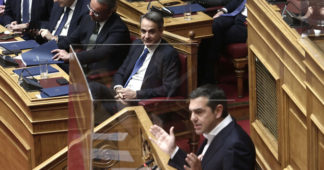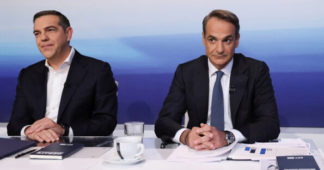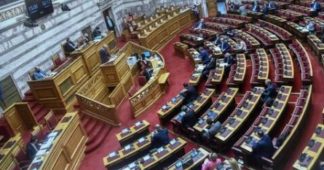New Democracy party is suffering after a deadly train crash, spying scandal and other issues, but opposition Syriza hasn’t been able to capitalize.
By Nektaria Stamouli
May 20, 2023
ATHENS — Greece’s conservative ruling party is expected to come out on top in Sunday’s election, but the marathon to form a government may be just starting.
The New Democracy party of Prime Minister Kyriakos Mitsotakis maintains a safe lead over its main rival, the left-wing Syriza, according to the latest polls, despite his premiership being burdened with a spying scandal, spiraling inflation and mounting concerns over the rule of law.
Perhaps most importantly in Sunday’s vote, his government has also faced pressure over its handling of a deadly train crash earlier this year.
But Syriza leader Alexis Tsipras seems to be still carrying the baggage of the tumultuous first months of his leadership in 2015 at the height of the financial crisis, which led to Greece’s third international bailout program.
Nonetheless, New Democracy is unlikely to get enough votes — 45 percent — to win an outright majority, as these elections are being held under a new proportional representation system. That means Greeks will probably head to the ballot boxes again by early July.
“These may not be the most crucial, but they are certainly the most complex elections we have ever had,” said Angelos Seriatos, head of scientific research at pollster Prorata. This is reflected in what pollsters say is a record number undecided voters heading into a national election.
The economy and soaring prices are the main worries that Greeks will have in mind when heading to the polls on Sunday, overshadowing concerns over the country’s tarnished image from the wiretapping scandal, the state of the media, charges of breaking EU law by pushing back migrants, and repeated alleged financial wrongdoings by conservative MPs.
“Both parties are focused on the cost-of-living crisis and boosting real wage growth and both parties are doing some soul-searching over how best to address the collective failure of the train crash,” said Megan Greene, global chief economist at Kroll Institute.
New Democracy’s main slogan resembles that of the Biden administration in the U.S.: Let’s finish what we started, including a continued push for digitalization in the economy, privatizations and an investment-led recovery, Greene explained. “Syriza is unsurprisingly more focused on improving collective goods such as health and education and on inclusive growth,” she said.
Still struggling
Unlike the several crucial electoral rounds and government changes that Greeks experienced during the financial crisis, these elections are not seen as that fateful. Uncertainty about Greece’s eurozone membership has vanished and the country achieved a remarkable financial turnaround, with its economy being one of the fastest growing in the EU, according to 2022 European Commission data.
But Greece is still struggling with many of the weaknesses that have weighed on growth for decades, including a massive bureaucracy, especially in the legal system, and chronic tax evasion.
“Greece was given about a decade of reprieve when the Syriza government restructured the debt, so very little of its debt is maturing for years,” Kroll Institute’s Greene said. “The window should have given the government the time and space to implement some difficult reforms, but so far this opportunity has been largely wasted.”
This suggests the country is once again building up “vulnerabilities to a sudden stop of foreign funding,” Greene added.
The country’s national debt stands at around 170 percent of gross domestic product, by far the highest in the EU, despite a decline mainly thanks to high inflation. Greece still bears the dubious distinction of being the only eurozone member whose sovereign debt has garnered a junk rating — even though Mitsotakis claims investment-grade status could be achieved within 100 days upon his potential re-election.
Austerity has inflicted deep scars on Greek society, with the country having one of the highest rates of people at risk of poverty. Real income decreased by 7.4 percent in 2022 due to high inflation, according to OECD data.
“It isn’t enough to address the immediate cost-of-living crisis — the government also has a responsibility to take a longer-term perspective and consider how to put out immediate economic fires while also implementing reforms that put Greece’s economy on a stronger footing going forward,” Greene said.
A key moment in the pre-election period was a train crash in February in which 57 people died, raising questions about the government’s competence.
The train crash “destroyed New Democracy’s arrogant narrative according to which the country is in the fourth industrial revolution,” pollster Prorata’s Seriatos said. “For a portion of voters who had shared this view, the train crash was disappointing and broke the bond with the party.”
The scenarios
New Democracy is currently polling at around 36 percent, Syriza at 29 percent and the socialist Pasok party at 10 percent. If these numbers are confirmed in Sunday’s vote, a coalition between the first and the third parties would be possible.
However, the relationship between Mitsotakis and Pasok leader Nikos Androulakis is particularly toxic after revelations in the wiretapping scandal showed that the state spy service had Androulakis under surveillance.
Mitsotakis has also made no secret of the fact that he would prefer a majority government, and would hold out for the second round of voting, when he has a better chance thanks to a system that grants the winning party up to 50 bonus seats in the second round.
Syriza favors a “progressive coalition” government, however it said that it would need to come in first in order for this to be attempted. Still, Tsipras might approach Pasok and other opposition parties to form a governing coalition. But it is doubtful that the numbers would add up for success in that endeavor.
The most likely scenario is that Greece will need a second round of elections to form a government. Thanks to the prospect of bonus seats in the second round, the winning party would then need around 38 percent to get at least 151 seats in the 300-seat parliament. New Democracy officials believe that their party is on track to meet this target in the second round.
“Failing that, if he is just a few seats short, Mitsotakis might try to tempt some opposition MPs to cross the aisle, otherwise he will likely seek coalition talks with Pasok,” said Nick Malkoutzis, editor and co-founder of economic analysis website MacroPolis. “This will be uncomfortable for both sides, especially in the wake of the surveillance scandal, but it probably will not be in their interests to fail to reach an arrangement because that would lead to third elections, which nobody really wants.”
Pasok’s Androulakis said he would be open to joining a coalition but sets as a pre-condition that neither Mitsotakis nor Tsipras would be prime minister, an option both of their parties have rejected.
The support the parties will get in Sunday’s first round will define to a large extent which scenario will be followed eventually.
“It will be very different if New Democracy wins the first elections with a gap of more than 5 percentage points, with a support close to 35 percent and a totally different scenario to score below that or at a short distance from Syriza,” Prorata’s Seriatos said.
We remind our readers that publication of articles on our site does not mean that we agree with what is written. Our policy is to publish anything which we consider of interest, so as to assist our readers in forming their opinions. Sometimes we even publish articles with which we totally disagree, since we believe it is important for our readers to be informed on as wide a spectrum of views as possible.











